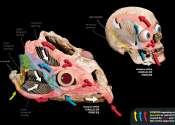Eberhard Karls University, Tübingen (German: Eberhard Karls Universität Tübingen, sometimes called the "Eberhardina Carolina") is a public university located in the city of Tübingen, Baden-Württemberg, Germany. It is one of Germany's oldest universities, internationally noted in medicine, natural sciences and the humanities. In the area of German Studies (German: Germanistik) it has been ranked first among all German universities for many years. Tübingen is one of five classical "university towns" in Germany; the other four being Marburg, Göttingen, Freiburg and Heidelberg. The university is associated with some Nobel laureates, especially in the fields of medicine and chemistry.
Currently, around 22,000 students are enrolled. The 17 hospitals in Tübingen affiliated with the university's faculty of medicine have 1,500 patient beds, and cater to 66,000 in-patients and 200,000 out-patients on an annual basis.
In the 2011 QS World University Rankings the University of Tübingen was ranked 152nd in the world, making it the seventh highest ranked university in Germany.
- Address
- Geschwister-Scholl-Platz, Tübingen, Baden-Württemberg, Germany
- Website
- http://www.uni-tuebingen.de/
Subscribe to rss feed









